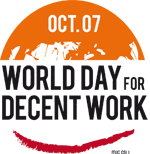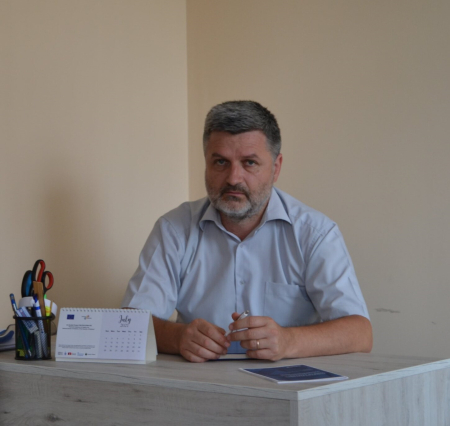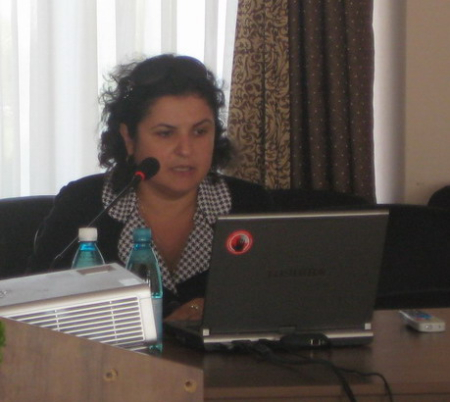Decent Work approached by the Moldovan authorities

Decent Work approached by the Moldovan authorities
Interview with Igor Chernyshev, international expert, Head of Yearly Indicators Unit, ILO Department of Statistics
Mr Chernyshev would you please tell our readers about the concept of Decent Work.
- The concept of Decent Work has been defined by the ILO and endorsed by the international community as opportunities for women and men to obtain productive work in conditions of freedom, equity, security and human dignity.
More specifically, Decent Work involves opportunities for work that is productive and delivers a fair income; security in the workplace and social protection for workers and their families; better prospects for personal development and social integration; freedom for people to express their concerns, organize and participate in decisions that affect their lives; and equality of opportunity and treatment for all.
Given the conceptual framework, how would you define the ILO Decent Work Agenda?
- The Decent Work Agenda is the balanced and integrated programmatic approach to pursue the objectives of full and productive employment and Decent Work for all at global, regional, national and sectoral levels. Decent Work provides a unified framework for the major areas of ILO work and draws attention to the relationships between its four strategic objectives:
- Fundamental principles and rights at work and international labour standards
- Employment and income opportunities
- Social protection and social security
- Social dialogue and tripartis1.
Stemming from the Decent Work Agenda, how would you describe the goal of Decent Work?
The overall goal of Decent Work is to effect positive change in people’s lives at the national and local levels. The ILO provides support through integrated Decent Work Country Programmes developed in coordination with ILO constituents. They define the priorities and the targets within the national development frameworks and aim to tackle major 8 Decent Work deficits (such as unemployment and underemployment, poor-quality and unproductive jobs, unsafe work and insecure income, rights that are denied and gender inequality) through efficient programmes that embrace and integrate each of the strategic objectives.
If the goal is to tackle major Decent Work deficits, there should be a set of measures to gauge progress on Decent Work. Would you please give an overview of such measures.
- Yes, indeed, the ILO has developed a set of Decent Work indicators, which were recommended for use by the 18th International Conference of Labour Statisticians (November-December 2008).
But let me first tell you why there is the need for Decent Work indicators. The matter is that while the traditional labour statistics mainly concentrated on the measurement of labour supply and labour demand as well as volume of work and wages in the economy, workers experience decent work (or decent work deficits) from a perspective which goes beyond the scope of traditional labour statistics. They might ask:
- How family-friendly are work arrangements?
- Do I get a living wage?
- Do workers have to work long hours?
- Can I join a union?
- Do migrant workers face discrimination?
- What happens when I fall sick?
- How dangerous is work?
- Will I get paid maternity / paternity leave when I get a baby?
On some of these questions, traditional labour market statistics can give answers – but it’s more difficult for others.
Given the complexity and diversity of Decent Work dimensions, the ILO has opted for a layered approach to indicators. This means that the system of Decent Work Indicators consists of the following categories:
- Main indicators: parsimonious core set of indicators to measure and monitor progress towards decent work. (18 currently)
- Additional indicators: to be used where appropriate, and where data are available (25 currently).
- Context indicators: provide information on the economic and social context for decent work (11 currently).
- Information included under legal framework (21 currently).
Importantly, the indicator should be presented separately by sex in addition to the total value.
Notably, countries are encouraged to select from the total list of indicators and add additional indicators to reflect national circumstances.
Mr Chernyshev, what about Moldova? To what extent the National Bureau of Statistics is in a position to produce Decent Work indicators to measure progress on Decent Work?
The results of the Joint Seminar2, organised on September 22 in Chisinau, demonstrated that the NBS can produce practically all main and the great majority of the additional Decent Work indicators. At the moment the NBS can already produce 78% of the main, additional and context statistical indicators from the proposed list of ILO Decent Work Indicators. In addition, the NBS can produce three more indicators for the Decent Work dimension Combining work, family and personal life. During the seminar the NBS presented its concept, definition and method of data. For the Seminar the NBS has produced tables with as many decent work indicators as possible.
Taking into consideration that the NBS is one of the most statistically experienced institutions in measuring informal employment (one of the main indicators of Decent Work dimension Employment opportunities), the ILO proposed to include this indicator as a special topic in the Seminar’s Agenda.
In addition, the NBS will try to produce more decent work indicators, provided the ILO prepares and supplies them with the Guide on Decent Work Indicators Definitions (in the process of finalization).
Given that, on the Department of Statistics’ recommendation, the ILO Policy Integration Department will consider Moldova for inclusion in its 2012 Work Programme on the preparation of Decent Work Country Profiles. This will promote Moldovan experience to the highest international level and enhance the country’s visibility worldwide.
In this regard, I would also like to acknowledge the advanced level of the Moldova labour statistics and high professionalism of my colleagues working at the NBS.
Mr Chernyshev, thank you very much for your answers and contribution to the Joint Seminar.
Notes: The seminar and interview have been conducted in the framework of the Joint UN Project on Strengthening the National Statistical System, with the financial support of ILO-Geneva.
1Tripartism refers to economic corporatism based on tripartite contracts of business, labour, and state affiliations within the economy.
2 In accordance with the Decent Work Country Programme and prior commitment of STATISTICS, the seminar on the topic „Statistical measurement of the decent work and of the quality of employment”, was organised on September 22, 2011 in the NBS premises, aimed at raising the awareness of the participants towards the concepts and statistical indicators on measurement of the “decent work” (concept elaborated by ILO) and of the “quality of employment” (concept elaborated jointly by the UNECE, Eurostat and ILO), as well as at practicing the application and usage of the respective indicators in the context of the Republic of Moldova. /newsview.php?l=ro&idc=30&id=3539&parent=0
- Report a mistake. Select the desired text and press CTRL + ENTER




